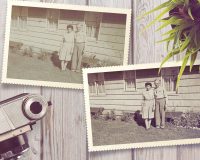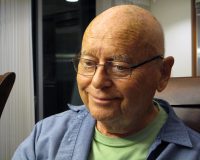As I was waking up this morning, I was aware of a dream that I was having. In the dream, I was sitting at a dining room table with the family of a client that I had done a video biography for. It was obvious that this person had recently passed and we were discussing the biography. A woman seated to my right said, “well that biography was wonderful except for that huge lie that she told about having lived in the palace at Versailles!”
At that point, I woke up and, after having a good laugh, I thought about this business of memoir and what is the truth. Back in December of last year, I wrote a blog piece, On Memory and The Truth, which looked at actual memory and how people typically filter memories from the past. Our brains are complicated companions and as we develop psychologically, we often slant the truth in order to support how we see the world and what we believe to be the truth. The ‘truth’ after all, is completely subjective according to who we talk to. There are the facts, which are usually undisputed, but how those facts support what happened and how different people see and process the truth are very individual.
To my knowledge, none of my clients has ever lived in Versailles, unless it was in a past life. I’m sure the ludicrousness of that was to merely point out the huge gap in truth as to be an outright lie. Lying in non-fiction memoir has probably always been an issue. You may recall the scandal in 2006 of James Frey’s memoir, “A Million Little Pieces”. After appearing on Oprah and having Pieces chosen for her book club in 2005, the website The Smoking Gun found “wholly fabricated or wildly embellished details” in the book. Frey later appeared on her television show where she shredded him for telling outright lies. She later apologized to Frey but the upshot to this was the attention paid to the truth in memoir. When David Sedaris published his book “When You Are Engulfed in Flames” the preface labeled the contents “real-ish.”
The video biography work that I do doesn’t get sold or sit on shelves, but it does represent capturing the stories of one’s life that are intended to be handed down to future generations; to educate, inspire and explain. How truthful do they need to be? This is something that I struggle with with many clients. I deal with people who are in all kinds of stages of reminiscence. Many with serious dementia are still able to precisely recall details from the past and convey them with truth and certainty. Some have a difficult time remembering dates or even some of the details. One woman I worked with could not remember how she met her husband. Another client I had worked with last year passed away a couple of weeks ago. This man had some serious memory issues and we could never really get enough traction to start, let alone complete the project. I was sorry to hear of his passing and as his niece said to me, “we really called you too late.”
I suppose I feel that if something is clearly a recognizable mistake, for example, the day World War II ended, I will stop the recording and have the client correct that. Usually there are support people around; children, secretaries, assistants, spouses, etc. who corroborate the stories. But if some non-truth or “real-ish” fact slips in, I don’t have editorial staff checking facts for publication. I think that most of the stories we manage to capture are for the most part true, and I would hope that anything obvious would not escape the family eye before they invite me over for dinner!
Stefani Twyford is a personal historian and video biographer sharing life stories, connecting generations and preserving legacies. To learn more, visit her web site, find her on Twitter as @stefanitwyford, visit the Legacy Multimedia Facebook Fan Page, or send her an e-mail.
| Sign up to receive our bi-monthly Legacy Multimedia Email Newsletter |









Stefani, I really enjoyed this article as you got to the crux of why people should preserve their lifestories to leave as a family legacy – “to educate, to inspire and to explain.”
I always tell both clients and students that recording their life stories is the chance to ‘set the record straight.’
And, yes, our memory of past events is slanted because that is the brain’s way of coping with the traumas that occur during everyday life. If we remembered everything in the same clarity, I’m sure we’d go mad!
Loved the photo of your dining room!
Thanks for the comment Annie. Have you seen the movie The Final Cut with Robin Williams? It tackles these very issues although has several plot lines going and can be a bit confusing. But it’s a wonderful movie that really examines how much of what we remember actually happened the way we remember it.